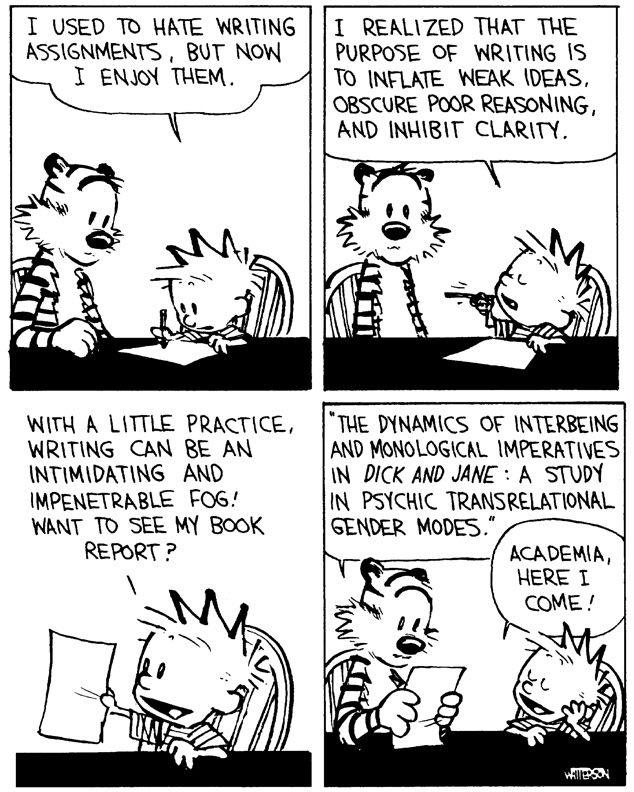
Modern academia is a cemetery for creative writing, and I regret to bear the news that you’re not protected from that curse. There’s the occasional glimmer of fun in the all too rare colourful judgement or creative law journal piece, but for a profession taught to row with words, it sure leaves much to be desired in wordsmithing. You’re expecting me to decry this, aren’t you? Poppycock—why ruin a perfectly good thing with such juvenile nonsense? You may concern yourself with aesthetics and prose on a schoolyard, but this is a professional setting. So heed you, fair reader, my ode to the proficiency of techno-jargon and tepid verbiage. We may all take a page from it, but I’ll start you off with around 950 words worth, so that you may find contentment in the mediocrity of safe writing.
Without these little runes on this very page, we’d only be able to express ourselves in grunts and glyphs, so here’s a beginning as good as any. A writer’s commerce is in his or her words, and you dear reader are little more than a pauper so long as you don’t have a top-heavy lexicon keen to be shown off with every keystroke. Like a full broadside, you’d do best to use these words in barrage, always firing on all cylinders. There’s no sense not using all you know—if you didn’t, others wouldn’t know that you know such vocabulary, and then God forbid your intelligence might be in doubt.
Your pick of words should be unnecessarily complex—even better if they’re unintuitive—but not rare. If you’re starting to sound like a Victorian novelist, then about face and double back to your liberal arts finishing school! No, instead you ought to use a chain of common yet hardly everyday or straightforward words, especially in situations where perfectly good, simpler substitutes would get the same meaning across. If your paragraphs don’t look like thesaurus entries structured by a schizophrenic, then you’ve taken a wrong turn somewhere.
Take these examples: You never “state,” you “posit.” Nothing is “impossible,” it’s simply “nonviable.” You don’t “include,” you “encompass.” One never “understands.” they “fathom.” You never deal in “justification,” but instead what is “epistemically possible.” Who knows what “normative” and “ontology” even mean, but that shouldn’t stop you from throwing them in. Maximum effect is earned from stacking and combining this mess of excess letters into scaffolds of roundabout sentences that hide your point from readers ‘neath layers of very smart words. Now use them ad nauseum, and reject the more concise cousins of this family of verbs, nouns, and adjectives.
Speaking of, Latin is a great intellectual crutch! Now, you can be pedestrian and just use standard lex Latin in the cloisters of law college, but why should the mediocre ever settle for less? Every writing flow is an occasion to interrupt with a totally clever inter alia or vide infra; putting down English phrases is just writing within a lower tuition fee bracket. Make sure to italicize any and all such usage—not to show your concern for grammatical correctness, but to act as a beacon for your originality in copying out of Kennedy’s Latin Primer. If you’re inclined to be extra special, you can opt for German words. Nothing spells “I took philosophy in undergrad” quite like using a language that’s just English except with more four and five-set compound words.
I’ve not a trace of idea why you’d ever want to use “simile” or “turns of phrase,” but if you fancy a literary flavour, ensure you lean on overused cliché idioms that also give you the illusion of being unique. Your reader will enjoy seeing “beat a dead horse” being used for nth time again just today. Since you’ve the questionable privilege of studying law, you get a bonus set of clichés to tire your writing with! Please, tell us again of “opening floodgates” and “slippery slopes,” or how something “does not follow” or “falls through the cracks.” It’s such a colorful language, even if the colour is drab brown.
No matter how benign your topic is, write as if it has the weight of the Gettysburg Address. It doesn’t matter that most academic & legal subjects are so infinitesimally particular that their public relevance is close to nil, you have something to say and everyone should hear it. It may be that your writing style is identical to droves of other pieces, but if you’ll really, really trust me, I cross my heart and do swear upon that which is sacred to me and everyone else that this is a really interesting article and will be a very intellectually stimulating contribution to the discourse on this important issue which you should definitely care about. Package it inside a title that’s much too long and jargon-laden—and voila!
Above all, don’t have fun while you’re writing. Your organised mess of words and syntax should be a spell of misery on even the greyest of days. The process should be excruciating. Finding the right word or rewriting a sentence altogether ought to be a burden that prolongs suffering and demands more intellectual performance. Your reader should just struggle to get through your blocks of text, and any flutter of joy or straightforward understanding of your point would be a personal failure on your part.
You’re a law student (see also: failed artist or intellectual trying to salvage a livelihood), and that means you’re very smart. So write like it! You’ll need to stand out and build a career where everyone will come to know how interesting you are thanks to you aping the same writing style millions of others use. If you’d like to start practising, you can write me hate mail, which you may direct to your nearest landfill.
